¶ Like good cholesterol, there’s good socialism. The first bill approved (overwhelmingly so) by the new 114th Congress renewed a federal program providing supplemental insurance covering acts of terrorism. First approved after the 11 September 2001 terrorists attacks, the current renewal will double (over a course of five years) the previous $100 million threshold.
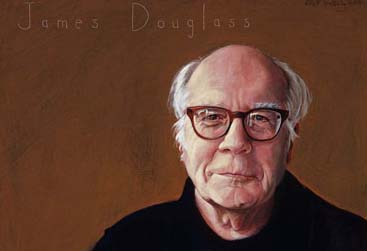 ¶ Americans Who Tell the Truth is a website that celebrates passionate folks who give a damn about justice. This link takes you directly to the portraits page. There you’ll find paintings and profiles of dozens of US citizens—some famous, some not so much—who have impacted our culture in profound ways.
¶ Americans Who Tell the Truth is a website that celebrates passionate folks who give a damn about justice. This link takes you directly to the portraits page. There you’ll find paintings and profiles of dozens of US citizens—some famous, some not so much—who have impacted our culture in profound ways.
The group includes James Douglass, whose book The Non-Violent Cross: A Theology of Revolution and Peace (1968, reprinted in 2006) was my first introduction to a theology (not just a practice) rooted in nonviolence.
¶ “When NCLB (No Child Left Behind, federal legislation approved in 2001 setting measurable public education goals) first came out I thought it was a good idea. Higher standards? Accountability? NCLB sounds great on paper. But in practice? It’s a disaster.” So says Matt Buys, a friend serving on our city’s school board, in an opinion piece in our local paper.
“I had two kids in schools when NCLB was put in place and immediately I saw my children go from loving knowledge, being naturally curious and telling me about their day at school to—and I wish I were exaggerating—lying on the couch exhausted because they had spent the day testing. . . . Creating wonder and awe, thereby inspiring creativity and a love of learning, is the most important things a teacher can do for your child.”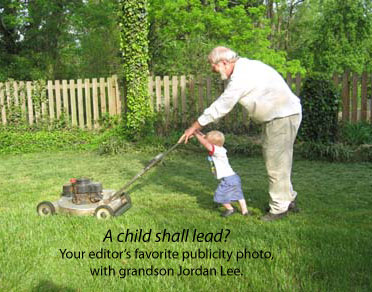
In that same edition of our Sunday paper was a front page story of Dwight Mullen, political science professor at a local university, who specializes in analyzing educational disparity along racial lines. One of a score of indicators: 69% of black students nationally graduated from high school in 2012, while the rate for white students was 86%. As Dan Domenech of the American Association of School Administrators told National Public Radio in 2011, "The correlation between student achievement and Zip code is 100 percent. The quality of education you receive is entirely predictable based on where you live."
Such statistical indicators of structural discrimination—and there are dozens in every conceivable measure of health and well-being in the US—suggest only two ways to interpret the disparities: Either African Americans (and other people of color, generally, and of low income, broadly) are cognitively deficient, morally lax or character defective. Or the deck is stacked against them. Attention to these and similar realities—with head, heart, hands and feet—is the sine qua non of biblical faith.
¶ “Not everything that counts can be counted and not everything that can be counted counts.” —Albert Einstein
¶ “And you, of the tender years, can't know the fears that your elders grew by / And so please help them with your youth, they seek the truth before they can die.” —“Teach Your Children,” Crosby, Stills, Nash & Young
¶ "[T]he harsh reality is this: We may have done away with Jim Crow laws, but we have a Jim Crow public education system." As Dan Domenech of the American Association of School Administrators told National Public Radio in 2011, "The correlation between student achievement and Zip code is 100 percent. The quality of education you receive is entirely predictable based on where you live. And where you live in America today depends largely on income and race." — Kevin Huffman, “A Rosa Parks moment for education,” Washington Post
¶ Keeping track. Starting in 2020, the US Census Bureau will have a new racial category option: MENA, or Middle East-North Africa. The Arab-Americans, who make up the majority of those who would be covered by the MENA classification, have been classified by default as white.
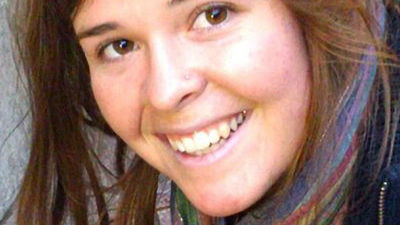 ¶ Mourning Kayla. “Some people find God in church. Some people find God in nature. Some people find God in love. I find God in suffering. I’ve known for some time what my life’s work is, using my hands as tools to relieve suffering.” —Kayla Mueller in a 2011 birthday card to her father. Mueller, a humanitarian aid worker from Arizona, was captured in August 2013 in Aleppo, Syria, by ISIS, which claimed this past week that Muller had been killed in an air strike. Mueller had worked with a variety of organizations, including an HIV/AIDS clinic and women’s shelter in Arizona, and aid work in India, Israel and Palestine. In December 2012 she began work with Syrian refugees in Turkey.
¶ Mourning Kayla. “Some people find God in church. Some people find God in nature. Some people find God in love. I find God in suffering. I’ve known for some time what my life’s work is, using my hands as tools to relieve suffering.” —Kayla Mueller in a 2011 birthday card to her father. Mueller, a humanitarian aid worker from Arizona, was captured in August 2013 in Aleppo, Syria, by ISIS, which claimed this past week that Muller had been killed in an air strike. Mueller had worked with a variety of organizations, including an HIV/AIDS clinic and women’s shelter in Arizona, and aid work in India, Israel and Palestine. In December 2012 she began work with Syrian refugees in Turkey.
¶ Lamentation. The news above pushed me to listen again to Mavis Staples’ rendition of Stephen Foster’s “Hard Times Come Again No More.”
¶ For more on lament, see Ken Sehested’s poem, “The Labor of Lament.”
¶ Amnesia. It’s virtually impossible to rightly read events in the Middle East without knowing the long history of Western nations’ colonial legacy in the region. I ask Charles Kimball, director of the University of Oklahoma Religion Department and a Middle Eastern expert, to suggest the best book outlining this history. His recommendations:
“Rashid Khalidi's Resurrecting Empire, although a few years old, is easily accessible and provides a critical account of US involvement in the region. An even older book, even more critical, is Stephen Zunes’ Tinderbox: U.S. Foreign Policy and the Roots of Terrorism.”
For an article-length read, I suggest “ISIS: The Spoils of the ‘Great Loot’ in the Middle East,” by Conn Hallinan
I highly recommend Kimball’s books, When Religion Becomes Evil: Five Warning Signs and When Religion Becomes Lethal: The Explosive Mix of Politics and Religion in Judaism, Christianity, and Islam. And if 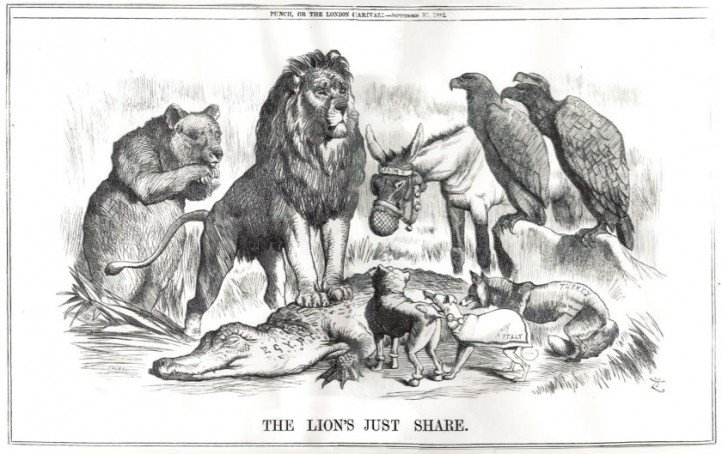 you’re looking for a good video resource (28 minutes) for Christian education on interfaith understanding, see this interview with Charles.
you’re looking for a good video resource (28 minutes) for Christian education on interfaith understanding, see this interview with Charles.
Illustration at right. A 19th-century cartoon skewers British imperialism in the Middle East. The current tumult in the region today is a direct result of the arbitrary boundaries and divide-and-rule tactics employed by the imperial British and French.
¶ “Oil is much too important a commodity to be left in the hands of the Arabs.” —Henry Kissinger, 1974, US Secretary of State under Presidents Nixon & Ford
¶ How unexamined assumptions work. I remember being appalled back in August 2007 when a Russian submarine crew planted a Russian flag on the seabed underneath the Arctic ice, in a symbolic claim to its energy resources. Such hubris!
Then it occurred to me: for nearly four decades I’ve never had a similar reaction about U.S. astronauts doing the same on the moon in 1969.
By the way, in case you’re counting, the U.S. now has six flags on the moon. Russia and Japan also have flags there. And now, according to the Indo-Asian News Service, India’s flag will soon join the lunar parade.
¶ Competition for a word’s meaning.
First, this: “Sniper [the blockbuster movie about Navy SEAL Chris Kyle, said to be the most prolific sniper in US military history] . . . is a nuanced tribute to evangelical militarism.” (Richard Corliss, “An Oscar for Sniper?”)
And then this: “A spirituality of liberation will center on a conversion to the neighbor, the oppressed person, the exploited social class, the despised ethnic group, the dominated country. Our conversion to the Lord implies this conversion to the neighbor. Evangelical conversion is indeed the touchstone of all spirituality. Conversion means a radical transformation of ourselves; it means thinking, feeling, and living as Christ—present in exploited and alienated persons.” (Gustavo Gutiérrez, A Theology of Liberation)
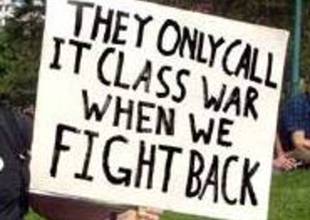 ¶ Toles cartoon. “You’re making exactly the same crazy impractical mistakes as Jesus.” —character in a Tom Toles cartoon lecturing Pope Francis who is holding a sign reading “love, caring, justice”
¶ Toles cartoon. “You’re making exactly the same crazy impractical mistakes as Jesus.” —character in a Tom Toles cartoon lecturing Pope Francis who is holding a sign reading “love, caring, justice”
¶ Speaking of Francis. “It is increasingly intolerable that financial markets are shaping the destiny of peoples rather than serving their needs, or that few derive immense wealth from financial speculation while many are deeply burdened by the consequences.” —Pope Francis, at a Vatican conference on ethical investing
¶ “Big heart and no conscience.” That was an ESPN sports channel analyst’s enthusiastic description of 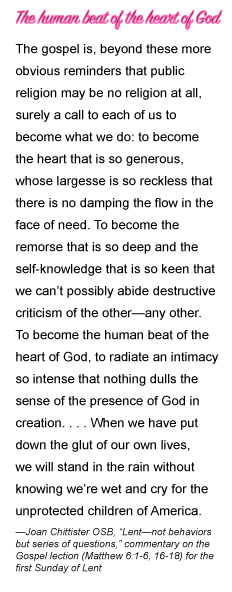 a player on one of the NCAA football championship teams (8 January 2015). In other words, he plays with passion and a reckless, take-no-prisoners abandonment.
a player on one of the NCAA football championship teams (8 January 2015). In other words, he plays with passion and a reckless, take-no-prisoners abandonment.
¶ Stigmata. Baylor University’s new football stadium cost $260 million. Auburn University’s new football stadium scoreboard cost $13.9 million.
¶ The legendary Hall of Fame football coach Woody Hayes of Ohio State was among college football’s royalty from the ‘50s through the ‘70s, making a bit over $40,000 in later years. The new legendary coach at Ohio State makes $4,000,000. The Great Recession mostly exempted major college sports.
¶ Which is why we need to tell the story of another sports legend, North Carolina basketball coach Dean Smith, who died this week. See Ken Sehested’s “Dean Smith: A remembrance.”
¶ If you missed Jon Stewart’s Daily Show opening monologue about the controversy surrounding NBC news anchor Brian Williams’ exaggeration of facts regarding his 2003 Iraq War coverage, it’s worth your eight minutes (following a couple short opening ads). At four-and-a-half minutes in Stewart turns the table on current media saturation with this “scandal.”
¶ Benediction. “Has a special fate been calling you and you’re not listening? Is there a secret message in front of you and you’re not reading it? Is this your last best chance? Are you gonna take it? Or are you going to the grave with unlived lives in your veins?” —Justine Last (played by Jennifer Aniston) in the movie, “The Good Girl”
# # #
Featured this week:
•A batch of new annotated book reviews are available in the “What are you reading and why?” section.
•Nancy Sehested’s “Pursuing God’s presence,” is a collection of annotated reviews of her favorite works by spiritually forming writers.
•Ken Sehested’s “Dean Smith: A remembrance” and “The Labor of Lament”
•Resources for Lenten preparation (four litanies and a meditation on fasting)
Lent is upon us
Disillusionment
Bright sadness
Come Into the Desert
Fasting: Ancient Practice, Modern Relevance
©Ken Sehested @ prayerandpolitiks.org. Language not otherwise indicated above is that of the editor. Don’t let the “copyright” notice keep you from circulating material you find here (and elsewhere in this site). Reprint permission is hereby granted in advance for noncommercial purposes.
Your comments are always welcomed. If you like what you read, alert your friends. Word-of-mouth is our best (not to mention our only) publicity.

